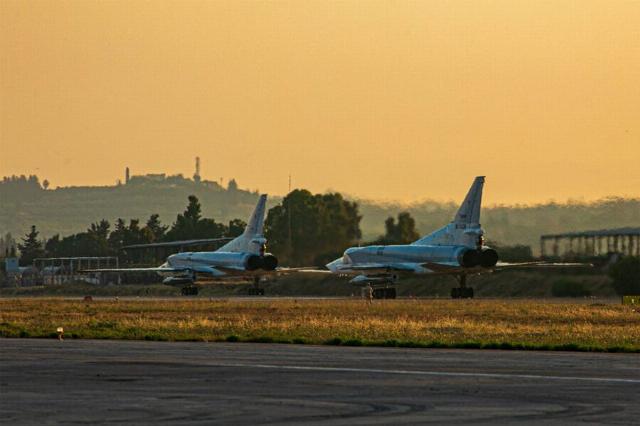Colonel Khodarenok: most likely, the Russian Armed Forces will have to leave their bases in Syria
On the morning of December 8, formations of opponents of Bashar al-Assad entered Damascus. Units and units of the Syrian Armed Forces and other law enforcement agencies have left the city. The capital of the country is in the hands of militants. Military observer of the Newspaper.En" Mikhail Khodarenok named the main reasons for the fall of the Assad regime in Syria and gave a forecast about the fate of Russian military bases deployed in the republic.
The offensive operation of the Syrian opposition forces "Deterrence of aggression" started on November 27. On December 1, the Syrian National Army joined the fighting, which announced the start of its operation Dawn of Freedom.
By December 8, armed militant groups captured the second capital of Syria, Aleppo, the city of Hama, the entire province of Idlib, the city of Homs and entered Damascus in the morning of the same day.
Automatic machine gun fire is currently being heard in Damascus. Bashar al-Assad has left the capital. Assad's wife and children had already flown to Moscow earlier. There is no exact information about where the former Syrian leader himself is currently located.
Key Damascus facilities, including the airport, the government quarter, the buildings of law enforcement agencies, leading media and the penitentiary system, are occupied by armed opposition groups. Syrian Prime Minister Mohammed Ghazi al-Jalali declared his readiness to cooperate with any leadership that the people choose. However, it is unlikely that the new leadership of the country will need his services.
As Bloomberg reported, yesterday, Syrian President Bashar al-Assad asked the United States to help stop military operations against terrorists who have seized part of the country's territory, in exchange for ending cooperation with the Lebanese Hezbollah movement and other groups supported by Iran.
But less than a day later, this plea of the former Syrian leader has become completely irrelevant.
The reality today is that the former Syria no longer exists, and it is still very difficult to say what will arise on the ruins of Bashar al-Assad's state (one or more states). In any case, the previous claims that Moscow won a major geopolitical victory in Syria, tested the combat capability of its Armed Forces, tested new models of weapons and military equipment, and created a springboard for spreading its geostrategic influence on the countries of the African continent today already sound, to put it mildly, somewhat irrelevant.
Analysts and historians will be dealing with the causes and features of the catastrophic defeat of the Bashar al-Assad regime for a long time. But two of them can probably be called hot on the heels today - the elimination of the power of the now former Syrian leader was greatly facilitated by Israel's defeat of the Hezbollah movement and the physical destruction by the Israel Defense Forces of the charismatic leaders of this organization, and, let's say, organizational and staff measures that led to the disbandment of one of Russia's private military companies, which in Syria has largely been a pillar of the Assad regime.
The main question for all of us now is how to carry out the withdrawal of Russian military specialists from Syria from Tartus and Khmeimim without losses. Unfortunately, both bases will most likely have to be abandoned. It is unlikely that with the new leadership of Syria it will be possible to achieve the prolongation of any agreements on the further stay of Russian military bases in the country.
It should be noted here that very, very considerable funds have been invested in the construction and equipping of these military facilities since 2015. The same Tartus was built almost from scratch. Khmeimim has also been turned into a first-class aviation base. And the author saw it all with his own eyes.
And I just want to tear my hair out that everything created with such difficulty and with such material costs (a lot of it was carried by planes) will most likely have to be abandoned. In other words, they built, created, strengthened, and now everything is down the drain.
As for the geopolitical consequences of the catastrophe of the Bashar al-Assad regime, detailed forecasts at least for the near future are still somewhat premature, since the situation in Syria is developing rapidly. In any case, new times are waiting for the Middle East in the near future.
The opinion of the author may not coincide with the position of the editorial board.
Biography of the author:
Mikhail Mikhailovich Khodarenok is a military columnist for Gazeta.Ru", retired colonel.
He graduated from the Minsk Higher Engineering Anti-Aircraft Missile School (1976), the Military Air Defense Command Academy (1986).
Commander of the S-75 anti-aircraft missile division (1980-1983).
Deputy commander of the anti-aircraft missile regiment (1986-1988).
Senior Officer of the General Staff of the Air Defense Forces (1988-1992).
Officer of the Main Operational Directorate of the General Staff (1992-2000).
Graduated from the Military Academy of the General Staff of the Armed Forces of Russia (1998).
Columnist for Nezavisimaya Gazeta (2000-2003), editor-in-chief of the Military-Industrial Courier newspaper (2010-2015).
Mikhail Khodarenok

